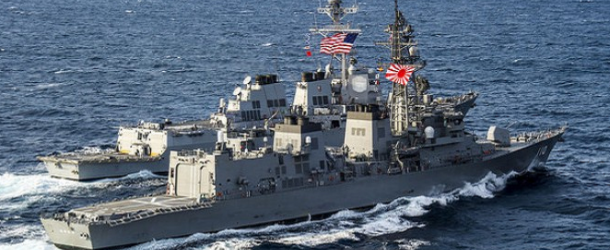It is no secret that Japan is a nation that exerts significant influence upon the geopolitical and geo-economic processes around the world and the vast Asia-Pacific region in particular. The posture of the U.S. that retains its exceptional status of the only superpower in the world largely depends on the relations with Japan, because in light of the weakening position of Washington in the international arena in the last decade the availability of allies plays an increasing role.
In the post-war period, the U.S. assumed the position of a nation that ensured military-political security of Japan, defeated in the World War II. Throughout half of the century, they reliably covered the “Land of the Rising Sun” with their ”nuclear umbrella”. This, in turn, has enabled the demilitarized Japan to transform into of the most powerful economic centers of the world in a short historical period.
The time after the September 11, 2001 has been characterized with the resurgence in the foreign and defense policy domains, the increase of Japan’s role in the area of ensuring international security, the active course aimed at providing support to U.S. military operations and the corrections in the course of national security, while acknowledging new challenges and threats. All of that has attested to Tokyo’s rising relevance in the alliance with Washington.
For a long time, the key objective of the American-Japanese alliance has been the preemption of the growth of Japan’s military capability. The view of the Washington was that powerful Japan with its centuries-long traditions of militarism could be the reason for serious destabilization in the region and thus, the U.S. stood ready to ensure a due level of Japan’s defense through own resources. However, with Shinzo Abe coming to power in December 2012, the former chose the course of solidifying country’s defense capabilities, realizing that the country would eventually have to confront the growing influence of Beijing. The Land of the Rising Sun adopted a number of legal acts on remilitarization and as of 14 January 2015, the government of Japan approved the largest in the nation’s history defense budget of 4.98 trillion Japanese Yen (roughly $ 41.97 billion).
On 26 April 2015, the Japanese Prime Minister paid a visit to the U.S. This visit occurred against the background of qualitative shifts of a global nature in the economic and strategic fields related to strengthening of China and aggravation of relations between Russia and the West over the infamous events in Ukraine. The parties attached great significance to the visit as an event called for identifying distinctive position of Japanese-American military-political alliance in the foreign policy priorities of both nations in the context of joint countering new challenges of modernity.
For Japan, combined military prowess of which is substantially modest compared to the one of China, the role of the alliance with the U.S. is firstly, embodied in the usage of it as a mechanism of ensuring security and stabilization of the regional system of international relations in the Asia-Pacific region. The most crucial factor for the Japanese is the security factor in the event of military conflict with China over the Senkaku Islands. Aggravation of relations with Russia is also not being ruled out (given that the full-fledged peace treaty is yet to be signed), due to the problem of the so-called “Northern territories”.
When it comes to the U.S., it is not the regional but the global context of relations with Japan that is essential. Washington is wary of having to confront China one-on-one and does whatever necessary to compel Beijing to reckon with the existing system of military-political alliances led by Washington. In general, the alliance with Japan is kind of a model, aimed at highlighting the preservation of America’s global dominance – something that Beijing has to acknowledge, at least because the combined prowess of the U.S. and allies would continue to exceed the one of China’s in the foreseeable future. Although Barack Obama incessantly emphasizes the need of “engaging” China and suggests that the alliance with Tokyo is not anti-Chinese by nature, for the U.S. solidifying military-political alliance with Japan objectively serves as a vehicle of additional pressure on China.
In this connection, one of the most notable outcomes of Abe’s visit to the U.S. was the agreement struck between the parties on revising the “Guidelines of Japan-U.S. Defense Cooperation”. This would be the third edition of the founding document for military cooperation between the two nations, first adopted in 1978. The new edition of the “Guidelines” declares the Japan-U.S. cooperation as indivisible, that is to say, covering the area of peace and calm, as well as the areas of combat operations. The only condition for initiation of such cooperation is the emergence of threat jeopardizing Japan’s security.
New “Guidelines” expected to come into force as of this summer would significantly expand the scope of joint operations involving Japan’s Self-Defense Force and the U.S. Army. During his recent trip to Japan, the U.S. Defense Secretary Ashton Carter stated that the revised version of the “Guidelines” would “help us respond flexibly to the full scope of challenges we face in the Asia-Pacific and around the globe”. In this sense, the Japan-U.S. alliance, previously regarded in the context of the East Asia, is now clearly acquiring the outlines of a global military alliance.
The Middle East is dubbed as one of the potential testing grounds for this cooperation, where the U.S. expects Japan to render palpable assistance in the fight against the “Islamic State”. Moreover, Abe himself has announced that Japan might deploy military ships to the Strait of Hormuz for conducting demining operations because oil supply disruptions are threatening Japan’s national economy. The decision on the circumstances where Japan’s Self-Defense Force would be deployed to participate in joint operations with the U.S. is yet to be made.
However, it was no coincidence that the speech of Japan’s Prime Minister in the U.S. Congress was titled “Towards an Alliance of Hope”.
Parvin DARABADI

























































